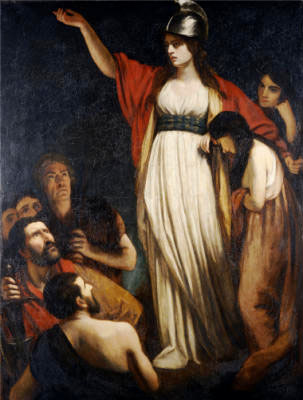|
After last week’s post on Caroline Norton I had to wonder how a woman could be victimized by her husband and have no recourse and was in effect in the eyes of English law a non-person. To look to the subjugation of women in England we have to go back two thousand years to the Roman period. The Celts who ruled before the Romans had a high regard for women they could be leaders of their tribe, could own property, were allowed to be warriors, healers or druids, and had a say in the government of their clan. And in a divorce was entitled to half their joint property. The differences in the Roman and Celtic views on women can be seen in the story of Boudicca, (sometimes spelt Boudica or Boadicea) queen of the Iceni. Upon his death her husband, Prasutagus, left his kingdom to be shared by his two daughters and the Roman emperor, Nero, believing this would keep the peace with the Roman governors in Briton. Unfortunately the Romans refused to recognize the rights of his daughters. In their world women could not rule, it was against Roman law. They flogged Queen Boudicca and raped her daughters. In retaliation Boudicca raised an army in rebellion. Although she had many victories, she was ultimately defeated. The exact date of her death is unknown. By the late 4th or early 5th century (Scholars disagree on the actual date) the Romans had withdrawn from Britain leaving behind a power vacuum which was filled by successive waves of invasions from the Scots, Picts, Jutes, and Saxons. The Saxon’s were the most successful and ruled most of England until the Norman Conquest in 1066.
In her book Women and Marriage in Nineteenth Century England, Mrs. Joan Perkins said this about the Saxons “In Anglo-Saxon England women had rights to property, to a share in control of domestic affairs and of children, even in a last resort to divorce and legal separation, departing with the children and half the martial goods.” Everything changed under Norman rule, with military service being linked to land ownership, women were pushed to the side. By 1180 women they were legally described as a sort of infant needing to be under the control of a husband or father. As a result they had very few rights. (I have read of this law in several of my text books, but nowhere does it state where this is referenced. If you know the author of this law I’d be interested in the details.) I can find very little change in the status of women for the next nine hundred years. It seems that owning property meant having power, which as society evolved translated into having the right to vote. I should point out that until 1832 the right to vote depended on being a man over the age of 21 and owning property. This meant that the vast majority of men could not vote either. Even after 1832 Reform Act, out of a population of about 30 million only 1.43 million could vote. It wasn’t until after World War 1 with the 1918 Representation of the People Act that all men over the age of 21 and women over the age of 30 gained the right to vote. (Statistics provided by BBC Bitesize History) So it seems that the voting rights of women, at least, ran hand in hand the rights of the common man. After the Norman Conquest power and freedom lay in the hands of a precious few. The rest of society worked and slaved with very little say in how things actually were. In Common law and church law a woman was essentially the property of her husband. There must have been hundreds, probably thousands of Caroline Norton’s over the years. Women who were abused and beaten by their husbands and found that there was nothing they could do to protect themselves or their children. We only know the fate of Caroline because she was well educated and well connected. A Woman's status as a non-person meant that they could lose everything in a heartbeat, desertion or abuse at the hands of her husband left her desperate with no legal recourse I am eternally grateful for the courage of women like Caroline Norton and Emmeline Pankhurst who fought so hard for our rights. 7/5/2014 03:14:08 am
Good article. We are immensely privileged to live in the Western world at the present time and we should never take this for granted. There are countries whose legal systems still treat women as chattels. Throughout history there have been honourable men who treated their wives and daughters with respect, but the law was weighted against them. .
Marlow
7/5/2014 04:49:36 am
I agree Madeleine. If it wasn't for these honourable men we wouldn't enjoy the privileges we have today. 7/5/2014 11:58:09 am
I knew a lot of this, but it's still pretty depressing to realize how much women have been controlled and dominated throughout English history.
Marlow
7/5/2014 12:31:21 pm
I agree Mary. To be honest when I started researching Victorian women, for a book I'm writing, I had no idea it would be so sad. I just had to know how it got that bad. It's horrid to think of a human being, any human being, as property. I even found instances of wives being sold as cattle auctions. Appalling 7/8/2014 11:49:11 pm
Great post. It is dreadful to think that in those days women were thought to be of less value than a man's livestock in many cases. We are lucky to live in these modern, more enlightened times.
Marlow
7/9/2014 03:38:50 am
Thanks Margaret. I agree, it certainly makes you count your blessings Comments are closed.
|
|
